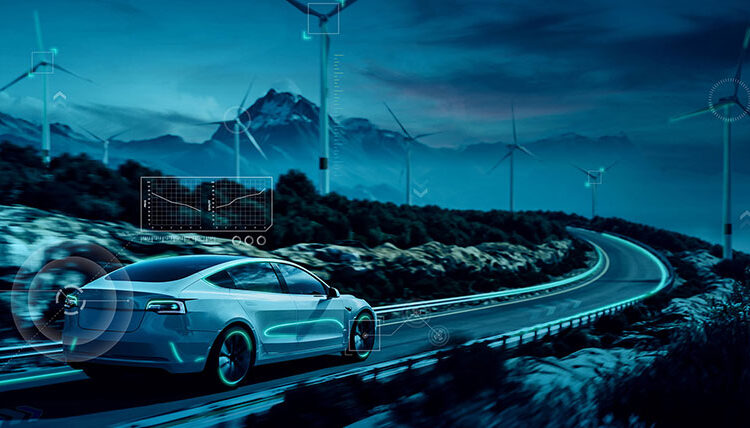Hexagon MI Research finds automakers are struggling to make electric vehicles more sustainable
- Car makers currently under pressure to prioritise forecourt selling points – cost and range – over resolving hidden carbon footprint of electric vehicles
- Research reveals electric vehicle makers’ focus and challenges, how they are balancing priorities, and smart manufacturing strategies to improve profitability and time to market
Independent research into electric vehicle (EV) development has found that most automotive companies are more focused on improving electric car range and reducing costs than improving the vehicles’ carbon footprint, despite mounting scrutiny of their hidden environmental impacts. The research has been published by the Manufacturing Intelligence division of global technology company Hexagon, whose technology touches 95% of all cars produced every year.
While EVs eliminate tailpipe emissions, they also produce a ‘long tail-pipe’ of increased demand for fossil-fuel-generated electricity, and reliance on energy-intensive materials and processes to construct vehicles and single-use batteries. A recent report by Volvo backs that up, announcing that EVs are far “dirtier” out of the factory gate, as the resource extraction for an electric drive train is so carbon-intensive, with EVs needing to clock up nearly twice as many miles compared to petrol cars to ‘break even’.
Despite this mounting scrutiny, only 38% of carmakers are currently increasing their investment in more sustainable design of EVs, which appears to be a much lower priority than the attributes that will appeal to consumers on the forecourt. Namely, the research also found:
- 84% are increasing investment in improving EV range
- 60% are increasing investment in design that will enable lower production and retail costs
- 58% are increasing investment in improving EV performance
These factors all improve the environmental footprint of an EV compared to a petrol car, but the research found that companies are hitting other roadblocks in achieving the vehicles’ full green promise. When asked about their challenges in achieving greener EVs, the majority of carmakers (56%) identify a lack of alternatives to rare-earth metals for batteries as the major obstacle. Half (49%) are also concerned about the lack of recyclable battery materials, closely followed by the lack of recycling programmes and infrastructure (47%).
Ignazio Dentici, VP Global eMobility Industry for Hexagon’s Manufacturing Intelligence division, said: “Our research reflects a welcome recognition by the auto industry that sustainability involves more than merely reducing road emissions, revealing an understanding of the whole-lifecycle manufacturing and material impact of vehicles. However, it also shows that despite this knowledge, car makers are feeling more pressure to compete for consumer sales than to ensure EVs are able to fulfil their core purpose of reducing the environmental impact of road transport.
“The industry is having to move at unprecedented speed to innovate in pursuit of improvements in range, production costs and sustainability, within an increasingly competitive environment and while facing significant supply chain challenges. To fulfil the promise of a net zero automotive industry sooner while balancing consumer demands, intelligent data-driven manufacturing approaches must be embraced that support the development of sustainable solutions for every part, as well as creating recyclable cars. Only by designing for a circular economy – from factory, to consumer and beyond – can we reduce demand for energy and materials in the coming years.”
Surveyed adopters of smarter product development and manufacturing approaches report cutting time to market by 25%, with the methods producing lighter, more recyclable materials, and more autonomous manufacturing to help resolve the tension between consumer demand and impacts on the planet, progressively reducing costs and development timelines for greener designs. Furthermore, synchronising design, testing and engineering is shown to dramatically reduce physical testing and failed products, providing engineers with the opportunity to address efficiency and sustainability at drawing board stage.
Supply chain vulnerabilities, as exemplified by the ongoing chip shortages, are identified as one of the biggest obstacles to expanding the production of electric vehicles, with 73% citing challenges sourcing the required volumes of materials. The research highlights different ways these are being addressed by smart manufacturing proponents, including vertical integration of production and open digital ecosystems that enable end-to-end visibility and control over materials across their lifecycle.
The report, Recharging the Automotive Market, is produced by Hexagon and draws from on original research conducted with Wards Intelligence and Informa Tech Automotive Group (ITAG), with a comprehensive survey of 416 eMobility design and manufacturing decision-makers across the global automotive supply chain.
Read the full report to discover the full results of the research, what is being done to resolve roadblocks in the transition to electric vehicles and where the industry will land in 2030 and 2040: https://emobility.hexagonmi.com/recharging-the-automotive-market
This content was first published on the Hexagon MI website.

